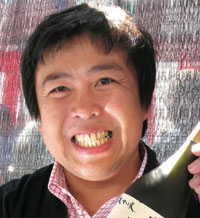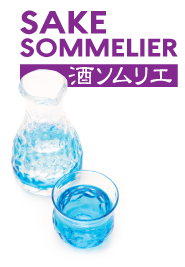Food and Japanese sake pairing
Yuji Matsumoto
Master Sake Sommelier
Finalist of the 2nd World Sake Sommelier Competition. Graduated from Keio University Faculty of Law, Department of Political Science. Worked for Nomura Securities for 10 years. Former president of California Sushi Academy Former chief of planning dept. at Mutual Trading. Currently working for Kabuki Restaurant Corp. as a Beverage Manager of Sake.
by Yuji Matsumoto
Especially when it comes to pairing Japanese sake with food, many people likely think, "What's with the exaggeration…? It doesn't really matter."
However, the reality is we often pair many foods with beverages subconsciously. For example, Japanese confections after a meal are often paired with green tea or coffee, while hamburger meat is often enjoyed with soda, fried foods with beer, and Oreo cookies with milk are great examples of such everyday pairings.
In this issue, I'd like to pass on to our readers a trick that enhances one's abilities to pair sake with food.
First, please select three brands of sake with very different properties. The differences in properties are hard to tell without drinking the sake, but first, let's select the sake according to the information listed on each label.
For example, please select a Junmai Daiginjo, Tokubestu Junmai, and Junmai Kimoto, all produced in different regions like Akita, Niigata, and Hyogo prefectures, etc. Sake produced in the U.S. are reasonably priced, for including a few of these brands in the mix may also be fun.
Once we have the sake, please grab some wine glasses (white wine glasses are better). Please be sure to use the same shaped glass for each of the three sake brands. It's best to store the glasses in the refrigerator for approximately 3 hours and to maintain their temperature at 55 degrees Fahrenheit.
And now, for the cuisine. Those who have time can prepare the food yourself, of course. However, I recommend takeout for those who want to compare the sake with many dishes from various types of cuisine. There’s no need to stick with Japanese cuisine, for it’s fun to also pair sake with Chinese and Italian (please avoid excessively spicy or strong garlic-flavored dishes) cuisines.
Please be careful to compare the balance between the sake and the food upon consumption, the changes detected in the umami flavors, and any changes in the aroma particular to that food, and aftertaste. If these factors in the pairing are satisfying, then it’s safe to say the pairing was a "success."
Master Sake Sommelier
Finalist of the 2nd World Sake Sommelier Competition. Graduated from Keio University Faculty of Law, Department of Political Science. Worked for Nomura Securities for 10 years. Former president of California Sushi Academy Former chief of planning dept. at Mutual Trading. Currently working for Kabuki Restaurant Corp. as a Beverage Manager of Sake.
by Yuji Matsumoto
Especially when it comes to pairing Japanese sake with food, many people likely think, "What's with the exaggeration…? It doesn't really matter."
However, the reality is we often pair many foods with beverages subconsciously. For example, Japanese confections after a meal are often paired with green tea or coffee, while hamburger meat is often enjoyed with soda, fried foods with beer, and Oreo cookies with milk are great examples of such everyday pairings.
In this issue, I'd like to pass on to our readers a trick that enhances one's abilities to pair sake with food.
First, please select three brands of sake with very different properties. The differences in properties are hard to tell without drinking the sake, but first, let's select the sake according to the information listed on each label.
For example, please select a Junmai Daiginjo, Tokubestu Junmai, and Junmai Kimoto, all produced in different regions like Akita, Niigata, and Hyogo prefectures, etc. Sake produced in the U.S. are reasonably priced, for including a few of these brands in the mix may also be fun.
Once we have the sake, please grab some wine glasses (white wine glasses are better). Please be sure to use the same shaped glass for each of the three sake brands. It's best to store the glasses in the refrigerator for approximately 3 hours and to maintain their temperature at 55 degrees Fahrenheit.
And now, for the cuisine. Those who have time can prepare the food yourself, of course. However, I recommend takeout for those who want to compare the sake with many dishes from various types of cuisine. There’s no need to stick with Japanese cuisine, for it’s fun to also pair sake with Chinese and Italian (please avoid excessively spicy or strong garlic-flavored dishes) cuisines.
Please be careful to compare the balance between the sake and the food upon consumption, the changes detected in the umami flavors, and any changes in the aroma particular to that food, and aftertaste. If these factors in the pairing are satisfying, then it’s safe to say the pairing was a "success."








